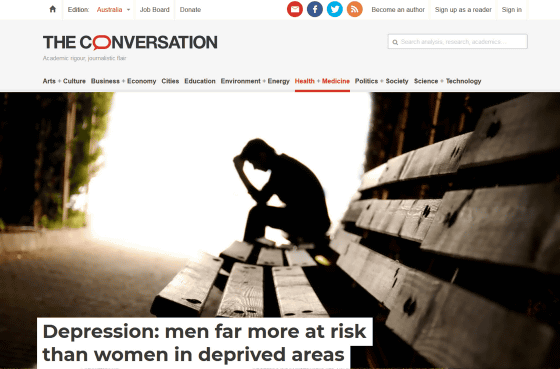Men who live in poor areas are at least 50% more likely to be depressed than men who live in other areas, but women are not affected

by
Depression that people around the world suffer is a serious illness that can lead to drug abuse, alcoholism, and suicide attempts. According to a study by a research team at the University of Cambridge , “men living in poverty were more likely to be depressed than men living in other areas, but where women lived affected the incidence of depression. The result was not clear.
Association between area deprivation and major depressive disorder in British men and women: a cohort study | BMJ Open
https://bmjopen.bmj.com/content/9/11/e027530
Depression: men far more at risk than women in deprived areas
https://theconversation.com/depression-men-far-more-at-risk-than-women-in-deprived-areas-127264

On the other hand, these factors are just their personal experiences and circumstances, and many of the past depression studies tended to focus on these personal factors. However, Remes thought that traits beyond the individual level, such as the attributes of the communities in which people live, also affect mental health and should be related to the risk of depression.
So, Remes' research team investigated whether people's risk of depression changes depending on where they live, even after removing personal factors related to risk of depression.

by
The research team used data from the EPIC-Norfolk study , a long-term survey of the health status, chronic illness, and lifestyle of nearly 30,000 people. In this study, the postal code of the place where the participant lives is also recorded, so based on the postal code, you can find out whether the participant lives in a wealthy area or in a poor area .
First, the research team evaluated the physical and mental health of participants at a given point in time, and investigated the well-being of the area in which each participant lives. In addition, the research team analyzed the results of questionnaires conducted 5 to 10 years after the evaluation. The research team investigated the relationship between depression and depression in a statistical manner, taking into account factors related to individual depression risk.
As a result, 'men living in poor areas are 51% more likely to become depressed than men living in non-poor areas, even after eliminating personal factors related to risk of depression.' Turned out. On the other hand, the results show that women living in poor areas are more prone to depression than women living in other areas, and it is men who have an impact on the likelihood of depression. I also understood that it was limited.

by
The results of this study are merely an investigation of the relationship between the residential area and the probability of depression, and it is unclear what the reason is behind it. However, Remes points out that the sense of responsibility that men feel in many countries, including the UK, that men must support and support their families may have led to this result.
A recent study investigating the difference in depression risk between men and women said that “being unable to deliver the expected results at work or not being able to support family life adequately” It has been shown to affect the ease of being. Men are more likely to be stressed by work and economic circumstances, and women are more likely to lose mental health due to failure of relationships.
In the UK, men are three times more likely to commit suicide than women, and Remes said it is important to figure out the underlying reasons why men are more likely to get ill. According to a report from the Ministry of Health, Labor and Welfare (PDF file) , men account for nearly 70% of suicides in Japan, and men are more likely to commit suicide than women.

Related Posts:
in Science, Posted by log1h_ik







